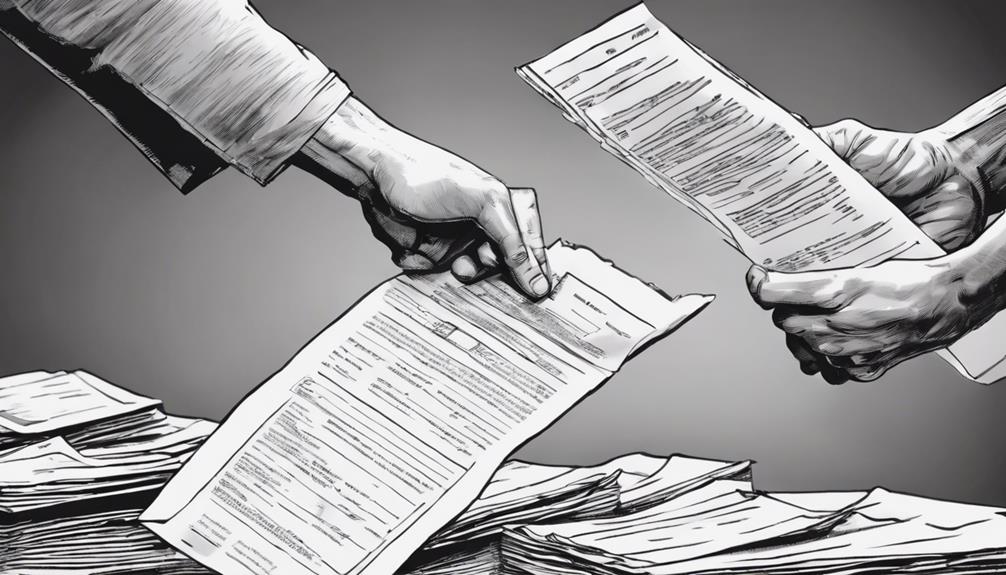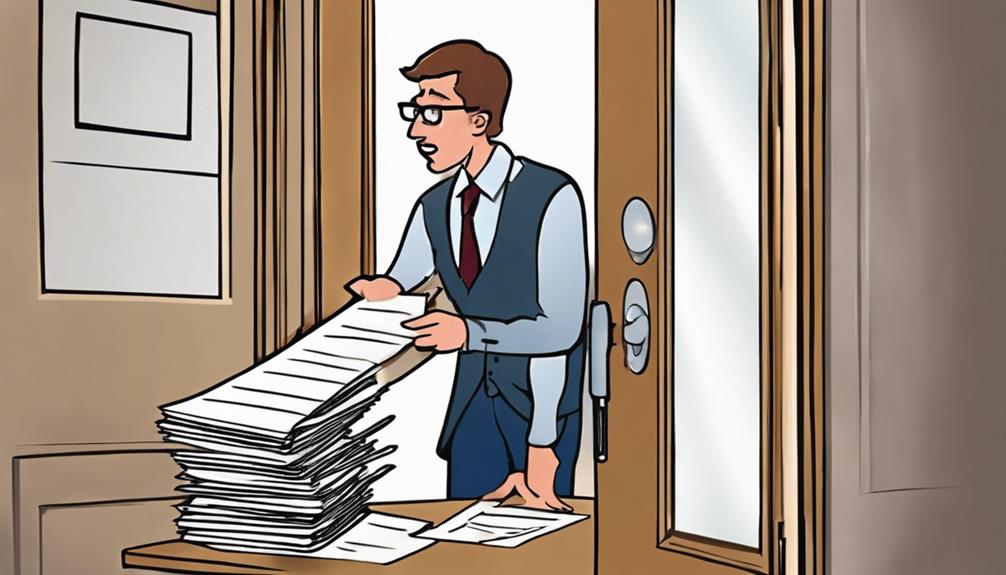Just imagine waking up one morning to find divorce papers waiting at your doorstep, a situation that can be overwhelming and confusing for many individuals. It is crucial to know the essential steps to get served with divorce papers to ensure that the legal process is initiated correctly and progresses smoothly.
From understanding the legal requirements for serving divorce papers to navigating the various methods available, each step plays a vital role in the divorce proceedings. Stay tuned to discover the ten essential steps that can make this process more manageable and less daunting.
Key Takeaways
- Understanding legal requirements for serving divorce papers is crucial for navigating the process effectively.
- Familiarize yourself with the contents of the divorce papers to respond appropriately within deadlines.
- Identify the server delivering the divorce papers to ensure compliance with legal procedures.
- Ensure the server meets the qualifications specified in Texas Rules of Civil Procedure for serving divorce papers.
Legal Requirements for Serving Divorce Papers
When serving divorce papers in Texas, we must adhere to specific legal requirements outlined in the Texas Rules of Civil Procedure. According to the Texas Rule of Civil Procedure, divorce papers can be served by a constable, sheriff, private process server, or court clerk. The methods of service allowed include personal service, registered or certified mail, substituted service by court order, service by posting, and service by publication. Texas Rule of Civil Procedure 103 specifies the individuals who are eligible to serve divorce papers, ensuring that the process is carried out by competent individuals.
Moreover, Texas Rule of Civil Procedure 106 mandates that the initial attempt to serve the papers should be made in person or by certified mail. Only if these methods are unsuccessful can the court permit alternative forms of service, such as via e-mail or social media, which is known as substituted service. By following these legal requirements, we ensure that the service of divorce papers is conducted in a manner that upholds the integrity of the legal process.
Understanding the Divorce Papers

Understanding the divorce papers thoroughly is essential for effectively navigating the legal process and ensuring active participation in the court proceedings. Divorce papers serve as a legal notification to the spouse, providing them with crucial information regarding the divorce filing. It is imperative to grasp the contents of these documents, including jurisdiction details, the cause number, and any important deadlines that need to be met. By carefully reading and identifying key information in the divorce papers, individuals can better equip themselves for the divorce process ahead. It is vital to respond appropriately to the divorce papers, which may involve hiring a lawyer or submitting a formal Answer within the specified timeframe to actively engage in the divorce proceedings. Below is a table summarizing key points related to understanding divorce papers:
| Key Points | Description | Importance |
|---|---|---|
| Legal Notification | Formal notification of divorce filing to the spouse | Crucial |
| Spouse Response | Providing a chance for the spouse to respond and participate in court proceedings | Essential |
| Important Deadlines | Deadlines within the divorce papers that must be adhered to | Critical |
| Hiring a Lawyer | Consideration of legal representation for navigating the divorce process effectively | Recommended |
Identifying the Server
As you navigate the process of divorce, we understand the importance of knowing who delivers your divorce papers.
The individual serving your papers plays a critical role in ensuring that legal requirements are met. By identifying the server, verifying their qualifications, and understanding their legal obligations, you can confidently proceed with the next steps in the divorce process.
Server's Role Explained
To comprehend the role of the server tasked with delivering divorce papers, one must be aware that this responsibility can fall on a constable, sheriff, private process server, or court clerk. Understanding the nuances of their roles is vital for ensuring a smooth legal process. Here are some key points to consider:
- The process server plays a crucial role in delivering legal documents efficiently.
- A court clerk may handle administrative tasks related to the filing and issuance of papers.
- Certified mail is often used as a method of delivering divorce papers.
- Substituted service may be employed if traditional methods of serving papers are unsuccessful.
- Each type of server has specific responsibilities and must adhere to legal guidelines to ensure proper notification.
Server's Qualifications Required
Let's now shift our focus to the qualifications required for the server responsible for delivering divorce papers in Texas, particularly those outlined in the Texas Rule of Civil Procedure 103.
In Texas, only individuals specified in Texas Rule of Civil Procedure 103 are permitted to serve divorce papers. Texas Rule of Civil Procedure 106 mandates attempting personal delivery or certified mail initially. If unsuccessful, substituted service, such as via email or social media, may be allowed by the court.
Specific requirements for serving divorce papers are detailed in Texas Rules of Civil Procedure, Part II, Section 5. For guidance on serving initial divorce papers and utilizing social media for service in Texas, TexasLawHelp.org is a valuable resource.
Server's Legal Obligations
In fulfilling the legal obligations as the server of divorce papers, one must ensure that they're a disinterested party over the age of 18. When serving divorce papers, it's essential to follow the specific rules outlined in the Texas Rules of Civil Procedure to ensure proper process serving. Here are some key points to consider:
- The server can't have a vested interest in the outcome of the case.
- Ensuring the papers are delivered according to legal requirements is crucial.
- Accurately completing and filing an Affidavit of Service or Return of Service is a must.
- Adhering to the guidelines for serving divorce papers is necessary.
- Understanding the legal requirements and responsibilities of the server is paramount for a successful serve process.
Methods of Serving Divorce Papers

When serving divorce papers, various methods can be utilized, including personal service, registered or certified mail, substituted service by court order, service by posting, or service by publication. Texas Rule of Civil Procedure 106 mandates attempting personal or certified mail service first before resorting to alternative methods.
Substituted service may be allowed by the court if other methods of service fail, such as via email or social media. Service by publication involves publishing a notice in a qualifying newspaper when the spouse can't be located. These methods are crucial in ensuring that the legal requirements for serving divorce papers are met, as outlined in the Texas Rules of Civil Procedure, Part II, Section 5.
Understanding the nuances of each method is essential to navigate the complexities of the legal process effectively. By following these guidelines, individuals can ensure that the service of process is conducted in a manner that complies with the law and protects the rights of all parties involved.
Serving Additional Court Documents

When serving additional court documents in a divorce case, it's crucial to ensure that all required forms are included, proper delivery methods are followed, and legal documentation guidelines are met.
This process is essential for keeping the divorce proceedings on track and allowing all parties involved to respond appropriately.
Without proper service of these documents, delays or complications may arise, impacting the overall progress of the case.
Required Court Forms
When ensuring that all necessary court forms are properly filled out, it's crucial to include the Motion for Substituted Service among the required documents for serving additional court papers. This form is vital when traditional methods of service have been unsuccessful, as it requests the court's permission to serve the divorce papers through alternative means.
In addition to the Motion for Substituted Service, other essential forms may include a Motion for Citation by Publication, depending on the specific circumstances of the case. These court forms play a significant role in seeking authorization to serve divorce papers through non-traditional methods.
- Motion for Substituted Service: Requests court permission for alternative service.
- Motion for Citation by Publication: Used based on case circumstances.
- Alternative means: Exploring different ways to serve divorce papers.
- Vital court forms: Necessary for non-traditional service methods.
- Permission request: Seeking authorization for alternative service approaches.
Proper Delivery Methods
Navigating the proper delivery methods for serving additional court documents demands attention to detail and adherence to specific guidelines established by the court or jurisdiction. In the serving process of court documents, various delivery methods like hand delivery, email, regular mail, commercial delivery service, fax, or electronic service may be utilized. It's crucial to comply with the specific guidelines in place to ensure that the court documents are served correctly and acknowledged.
Different court documents within legal proceedings may have unique requirements for how they should be delivered to the involved parties. Understanding and applying the correct delivery methods for serving additional court documents is essential to uphold the integrity of the legal process and guarantee proper notification to all parties involved.
Legal Documentation Guidelines
Understanding the legal guidelines for serving additional court documents is crucial in ensuring the smooth progression of a divorce case. When it comes to legal documentation in family law matters, attention to detail is paramount. Here are some key points to consider:
- Consult with a legal professional: Seek guidance on the correct procedures for serving court documents.
- Timely service: Ensure all documents are served promptly to comply with legal requirements.
- Types of documents: Different court documents may require specific methods of service.
- Court rules: Familiarize yourself with the court's regulations regarding serving additional documents.
- Consequences of improper service: Failure to serve documents correctly can lead to delays or adverse outcomes in the case.
Serving Divorce Papers With Children

Considering the well-being of children during a divorce is paramount, especially when it comes to serving divorce papers with children involved. Addressing aspects such as child custody, visitation schedules, child support, and parenting plans in the divorce papers is crucial. It's essential to include additional forms like the Suit Affecting the Parent-Child Relationship (SAPCR) to ensure all necessary information is provided.
To help you visualize the importance of serving divorce papers with children, we have created a table outlining key considerations:
| Key Considerations | Details |
|---|---|
| Child Custody | Determining where the children will live and how decisions will be made regarding them. |
| Visitation Schedules | Establishing a plan for the non-custodial parent to spend time with the children. |
| Child Support | Ensuring financial support for the children's needs post-divorce. |
| Parenting Plans | Outlining how parental responsibilities and decision-making will be shared. |
When serving divorce papers with children, it is vital to comply with state-specific laws, always keeping the children's best interests at heart. Seeking legal guidance can help navigate these complexities and ensure the rights and needs of the children are protected throughout the process.
Serving Divorce Papers Without Children

When serving divorce papers without children, we focus on a streamlined process that allows for a quicker resolution.
The absence of child custody or support issues simplifies the paperwork and legal proceedings.
This can lead to fewer complications and a smoother transition to the next steps in the divorce process.
No Kids Involved
Delivering divorce papers in cases without children involves ensuring the spouse receives the necessary documents to initiate the legal proceedings. When there are no kids involved, the focus shifts to serving the divorce papers promptly and correctly.
Here are some key points to consider:
- The spouse must be served with the citation and the Original Petition for Divorce.
- Service options include personal delivery, registered or certified mail, substituted service by court order, and service by posting or publication.
- Cases without children often have fewer complexities, making the process more straightforward.
- It's crucial to follow proper service procedures to ensure the divorce process progresses smoothly.
- Obtaining the spouse's receipt or acknowledgment of service is essential for documentation purposes.
Simplified Divorce Process
In our experience, ensuring the proper service of divorce papers in a simplified process without children is a critical initial step towards legal dissolution of the marriage.
Serving divorce papers without children involves notifying the spouse through methods such as personal service, certified mail, or substituted service by court order.
The spouse must receive the initial divorce papers, which typically include the citation and petition, to be informed of the legal proceedings. Proper service is essential to move forward smoothly with the divorce process.
Minimal Legal Complications
Navigating the process of serving divorce papers without children requires meticulous attention to detail and adherence to state laws and court procedures. When dealing with such cases, ensuring that the spouse is properly served is crucial for initiating the legal process accurately. Here are some essential steps to minimize legal complications in serving divorce papers without children:
- Verify the specific requirements for serving divorce papers in your state.
- Confirm the correct method of serving court papers to your spouse.
- Document all steps taken in serving the divorce papers to ensure legal compliance.
- Consider seeking guidance from a legal professional to assist with the process.
- Understand the implications of serving divorce papers correctly to prevent delays in the divorce proceedings.
Service by Publication and Posting

When resorting to Service by Publication and Posting in divorce proceedings, meticulous adherence to court-approved procedures is crucial for ensuring legal compliance and providing the spouse with the opportunity to respond.
Service by Publication involves publishing a notice in a court-approved newspaper when the spouse's whereabouts are unknown. This notice typically needs to run once a week for a specified number of weeks to meet legal requirements.
On the other hand, Service by Posting requires physically posting a copy of the divorce papers at the courthouse when the spouse can't be located. The posting must be done in a specific location at the courthouse for a designated period to allow the spouse a chance to respond.
Both methods necessitate court approval and are utilized when traditional service methods have been unsuccessful. By following these prescribed steps diligently, we ensure fairness and adherence to legal protocols in divorce proceedings.
Setting Aside Default Judgments

With a focus on rectifying oversights in legal proceedings, we prioritize addressing default judgments in divorce cases to ensure fairness and due process for all parties involved. When it comes to setting aside default judgments, careful consideration and proper procedure are crucial.
Here are five essential points to keep in mind:
- Proving Lack of Proper Notice: Demonstrating that you weren't properly served divorce papers is a key factor in setting aside a default judgment.
- Establishing Excusable Neglect: Showing valid reasons for the failure to respond, such as illness or misinformation, can support a motion to set aside the judgment.
- Presenting a Valid Defense: Having a strong defense against the divorce claims is a compelling reason for the court to reconsider the default judgment.
- Prompt Action Required: Acting swiftly is essential when seeking to set aside a default judgment to avoid further complications.
- Adhering to Court Procedures: Following the correct legal steps and filing the necessary paperwork accurately is vital in this process.
Serving Respondents Abroad

In our experience, serving respondents abroad in divorce cases involves meticulous adherence to international service of process regulations. When serving respondents abroad, it's crucial to be well-versed in the Hague Convention on the Service Abroad of Judicial and Extrajudicial Documents, which governs service in participating countries.
Hiring a professional process server who's familiar with international service requirements can streamline the process and ensure compliance with the specific procedures of different countries for serving divorce papers to respondents abroad.
Failure to comply with international service rules can result in significant delays or even dismissal of the divorce case, underscoring the importance of precision and attention to detail in serving respondents located outside the country. By following established protocols and seeking assistance from experts in international service, individuals can navigate the complexities of serving respondents abroad effectively and efficiently, ultimately facilitating the progression of the divorce proceedings.
Frequently Asked Questions
How Long Does It Take to Serve Divorce Papers Texas?
We serve divorce papers in Texas within the required 91 days. Timely service is key for legal progress. Failure to serve promptly may lead to dismissal. Varying methods impact service timeframes. Proper, timely delivery is essential.
How Much Does It Cost to Have Someone Served Divorce Papers in Texas?
Getting someone served divorce papers in Texas typically costs between $50 to $100 or more, depending on location and chosen method. Extra fees may apply for process servers or publication. Budgeting for this step is crucial.
What Are the Legal Steps in a Divorce in Texas?
Navigating a divorce in Texas involves crucial legal steps, such as filing a petition, serving divorce papers, and addressing property and custody matters. Proper service of process is vital to ensure the process is valid.
What Are the Legal Ways to Serve Someone in Texas?
We serve divorce papers in Texas legally through personal service, registered or certified mail, substituted service by court order, service by posting, and service by publication. These methods ensure proper notification following Texas law.
Conclusion
As we close this chapter on serving divorce papers, remember it's like planting a seed in the garden of legal proceedings.
Just as a gardener tends to their plants with care and precision, serving divorce papers requires attention to detail and a gentle touch.
Trust in the process, seek guidance when needed, and watch as the seeds of change begin to grow and bloom in your life's garden.
Stay strong, stay hopeful, and remember, you're not alone in this journey.










